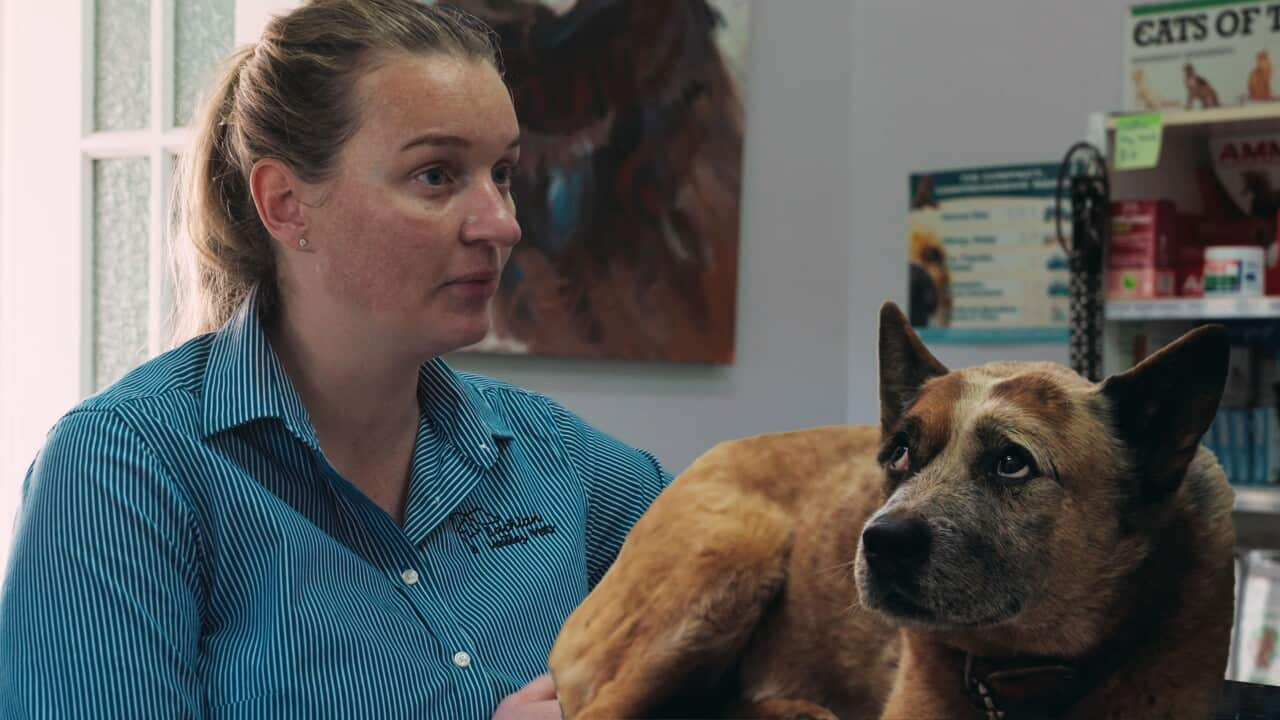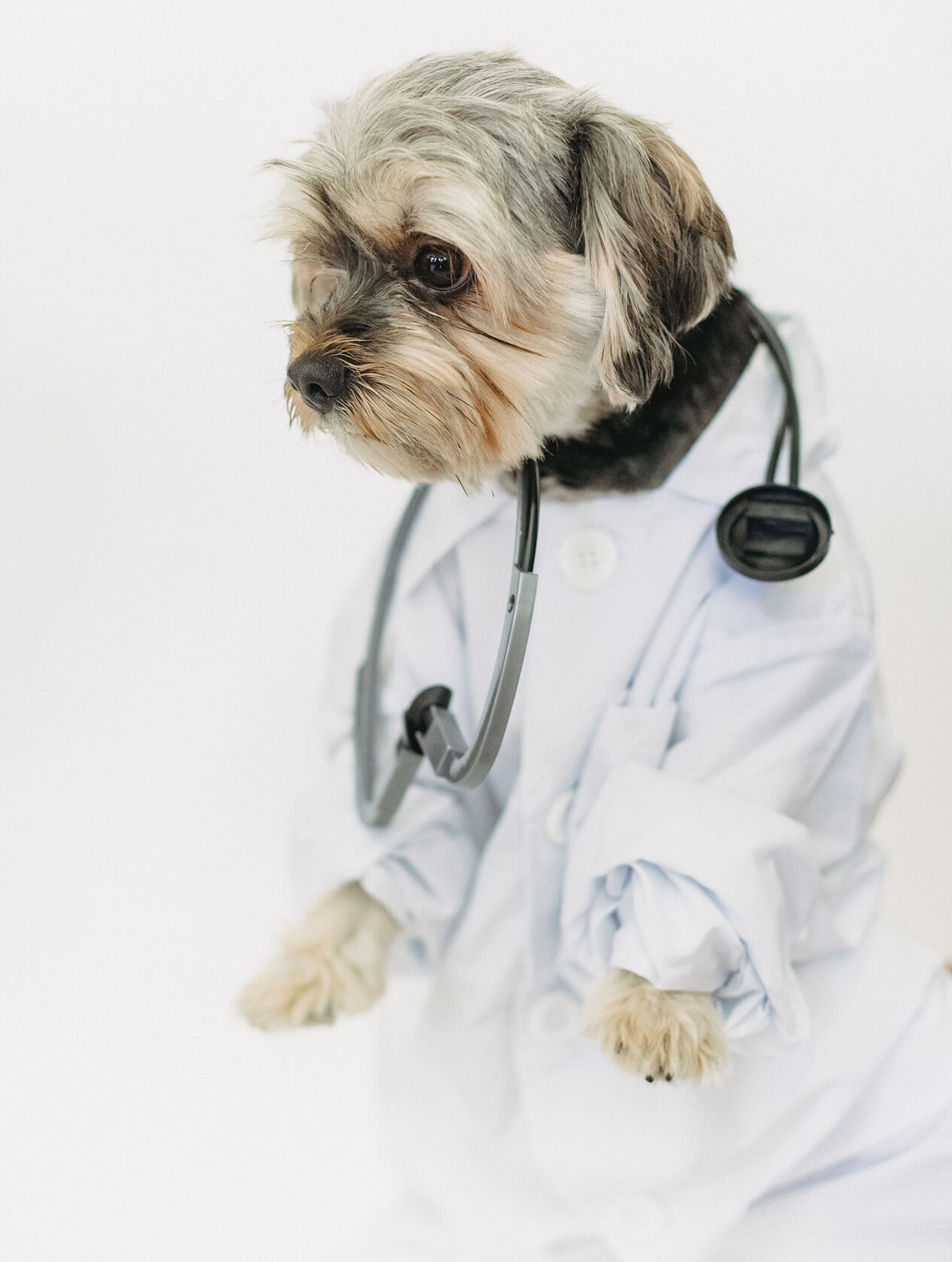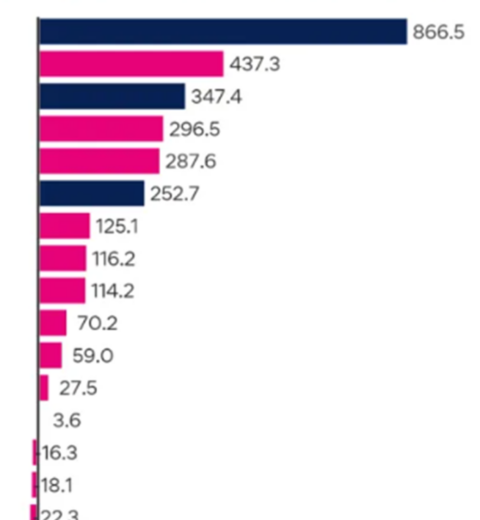Published 30 August 2023 By Ilias Bakalla | Article Courtesy: SBS
Tess was assaulted, sworn at and short-changed by clients. It’s shattering her dream job as a vet
Tess Bailey is a vet in regional NSW. She’s owed $70,000 in unpaid client bills and often has to work around the clock. She’s not the only one: Australia is facing a serious vet shortage, amid a pandemic pet boom.

Tess has been looking for a replacement vet in her clinic for two years and due to shortages, she regularly works 12 hour days. Source: SBS
This story mentions suicide.
“It makes you personally feel like they don’t see that you’re worthwhile,” Tess Bailey tells The Feed.
“They don’t think that the effort that you put in or the knowledge that you have is worth paying for.”
Tess’s vet clinic provides 24/7 care in Forbes, NSW and in emergency situations clients often bring their animals in late at night.
She says she’s owed $70,000 from clients.
“They come in, they don’t have their wallet, they don’t have their shoes on, they’re just in their jammies (pyjamas),” she said.
Either Tess or another vet in her clinic will treat the animal but sometimes the owners won’t come back to pay.
“If we had no money owing, it might mean that I could get paid a little bit more or, I could be paying my vets more, which means that then we’re able to bring more vets to the area.
“It’s not sustainable to be that exhausted when you’ve done a caesarean at 3am in the morning, and then you’ve gotta come back at 8:30am to work a full day.”
Tess said that for as long as she can remember she has wanted to be a vet.

Throughout high school and university, she studied hard to get the marks she needed to become one and says: “There was no backup plan, I was going to be a vet.”
“And it’s not just a job, it’s not just a nine-to-five.
“You’re coming in on weekends to check up on cases. And it’s really hard to imagine what I would do without it.”
Australia’s vet shortage
Over the past three years, there’s been a pet boom in Australia, with many households getting pets during COVID-19 lockdowns.
At the start of the pandemic, 61 per cent of us had pets. Now it’s estimated 69 per cent of Australians have an animal at home. And the total number is higher than our human population: according to Animal Medicine Australia’s pet ownership report there are 28.7 million pets across the country (Australia’s population is 26.2 million).
And while Australia’s pet population has increased by 200,000 since the start of the pandemic, the number of vets only increased by about 2000 in that time.
President of the NSW division of the Australian Veterinary Association, Zachary Lederhose, told The Feed that while people were in lockdown they spent more time with their pets and noticed their animals’ medical issues more.
“What we saw during Covid was an increased workload, not just in terms of the number of animals we were treating, but the type of treatment we were doing,” he said.
“Because people were spending more time with their animals, they valued their animals more so they were asking for more treatments.”
Zach, who also runs a vet clinic in Goulburn, said the vet shortages are felt most acutely in the regional areas of NSW. He also said the increase in pets doesn’t take into account the livestock, wildlife and racing animals that vets also care for.
“We’ve got a capability shortage, especially in those regional areas because only 8 per cent of vets in New South Wales are working regionally,” he said.
“But we’ve got food production animals in the regions so our sheep, our cows our horses.”
“And they’re also spread over a wider geographic area, so they’ve (vets) got to drive onto the farm so your resources are spread even more thin.”
The situation is so dire a parliamentary inquiry into vet shortages in NSW has been called. Submissions have flowed in with stories of burnout, abuse and enormous difficulties in attracting vets to regional positions.
On average, 40 per cent of job vacancies for vets take a year to fill in NSW.
Tess lives that statistic. Two years ago she had the opportunity to buy the clinic she’d been working in for eight years when the previous owner retired.
“We haven’t been able to replace him yet, so we went from three vets down to two vets,” she said.
“With the decrease in vets and then the increase in people with pets it’s been, very, very busy.”
On top of shortages and clients not paying Tess said abuse from clients is also common.
“I was physically assaulted by a client after hours, the dog had a broken leg,” she said.
“And the owner went off, they were pulling my hair, smashing things in the clinic. I was there by myself because it was after hours and it got to the point where I had to call the police.”

“You can have 99 beautiful clients, and then one person will swear at you and it ruins the day. The whole clinic feels that tension.
“And, no one deserves to be sworn at anywhere or made to be belittled or made to feel worried about their physical health.”
There have also been reports of client abuse in submissions to the NSW parliamentary inquiry.
Tess says owners can be emotional when their pet is in an emergency situation and in circumstances where the pet dies abuse can follow.

“If an animal dies, we already feel terrible about it. We don’t aim to have animals dying under our circumstances. But when the first thing that people say is: ‘Oh, we’re gonna sue you’ it takes a toll on you,” she said.
“Then you’ve got in the back of your head ‘Am I gonna have to go to court?’ ‘Am I gonna have to get a lawyer?’ and that takes up a lot of emotional energy.”
High suicide rate among veterinarians
Garry and Kate Putland lost their daughter Sophie Putland to suicide in September 2021 when the pressures of the industry and client abuse became too much.

“Sophie was completely passionate about being a vet,” Kate said.
Garry said: “I spoke with Sophie on the Monday night before she took her life after she’d been abused.”

“I caught her about 20 minutes after and she was distraught. I said to her ‘let it go, let it go’. But I don’t think she accepted that really.”
Sadly, Sophie’s story is not uncommon among vets.
A spokesperson for the Australian Veterinarian Association told The Feed vets are nearly twice as likely to die by suicide compared to the general population.
Garry said Sophie had mental health issues that she was managing really well.
“Unfortunately, an abuse episode happened the Monday before she took her life and for all we know, it could have actually tipped her over,” he said.
“Words matter for these people because they’re very proud and they’re very good at what they do.”
Garry and Kate said they often heard from Sophie about the client abuse she received.
“We would get phone calls at three in the morning with her having worked an 18-hour shift,” Kate said.
“Sometimes it coincided with abuse and she’d ring us up and she would be just sobbing, absolutely sobbing her heart out. It was really, really tough.”
Sophie told her parents that clients would threaten to make complaints to the veterinary association.
“That can take six months before that issue is resolved, and often they’re resolved. But this hangs over the vet’s heads, and that used to really hang over Sophie’s head,” Kate said.
Garry said: “It happened a few times to Sophie and I can’t remember the specifics but it was more about these people having unrealistic demands of their vets.”
“If they had a negative finding, she’d be struck off as a vet. So there was always that thing in the back of her mind, well, this could go pear-shaped and I could lose my job.”
‘If you cared about animals, you’d do this for free’
Olivier Liyou, who has been a vet for 30 years, runs a dental hospital for horses in northern NSW.
He told The Feed he received a death threat from a client after their horse, who Oliver had been treating, died.
“He reckoned the antibiotic I gave to his horse killed it,” Oliver said.
“That was pretty confronting. He was dead set screaming down the phone saying he’s coming around to kill me right away.”

While that was an isolated incident, Oliver said it’s common for clients to emotionally manipulate him.
“People say: ‘If you cared about animals, you’d do this for free’.
“You hear it all the time, people say: ‘Oh, they’re just a rich vet.’ ‘They’re just in it for the money.’ ‘They don’t care about animals.”
“Unless we get tougher on it (client abuse) its going to keep on happening. I think we’ve got to call out this kind of abuse ’cause it’s not on.”
Tess wants the public to understand that owning a pet comes with the responsibility of caring for it and that care costs money.
“Hearing those things like: ‘oh vets are so expensive’ and ‘it’s cheaper just to buy a new dog than to do that’ over and over and over really does take its toll on you,” she said.
“If you have a pet, it’s because you choose to have a pet and we are just trying to look after your pet.
“At the end of the day, we are still people. We might make mistakes because we’ve been here all night and we’ve been working seven days in a row. If we can’t get your animal in, don’t abuse us.”
If this story has brought up anything for you, you can call Lifeline on 13 11 14. You can also call Headspace on 1800 650 890 or the Kids Helpline on 1800 551 800.
If you or someone you know is in immediate crisis, please call police and ambulance on 000.




